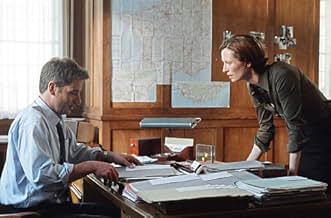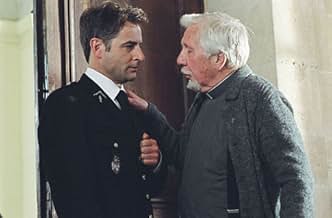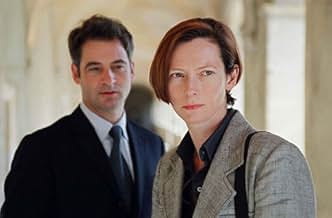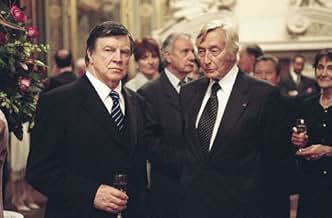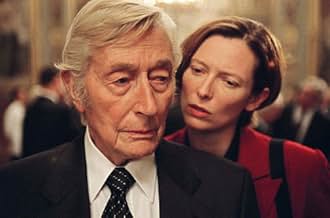VALUTAZIONE IMDb
6,2/10
5726
LA TUA VALUTAZIONE
Aggiungi una trama nella tua linguaTale of a former Nazi executioner who becomes a target of hitmen and police investigators.Tale of a former Nazi executioner who becomes a target of hitmen and police investigators.Tale of a former Nazi executioner who becomes a target of hitmen and police investigators.
- Premi
- 4 vittorie totali
David de Keyser
- Dom André
- (as David De Keyser)
Recensioni in evidenza
I rated this film a 7/10 - with some mixed feelings, because in many ways it was a downbeat film without any kind of neat "message" that would make me feel "a better person" for having seen it. But on second thought I realized that the finished film rather neatly reflects the moral complexity of Brian Moore's novel which it is based upon - and which Ronald Harwood's screenplay follows remarkably closely.
Brian Moore is one of my favorite late 20th century authors, whose work has provided the basis for several other memorable films, most notably "Black Robe." He writes in a Graham Greene-esque mode, his characters often anguished or guilty Catholics or ex-Catholics who struggle to live morally in a degraded and corrupt world. Moore himself appears to have known much about divided loyalties and twentieth century alienation. Although identified as a Canadian author, Moore was born in Ulster - and actually lived most of his later life in California and the South of France. He was clearly fascinated by questions of faith, of good and evil - and he boldly tackled these themes in "The Statement."
In France in the late 1980s and early 1990s there were several prominent cases of Vichy-era collaborators who were belatedly brought to justice by the French court system. Moore was clearly fascinated by the way in which leading members of the French governmental and bureaucratic system continued to hide unpleasant truths about their own pasts - and by the role of the Catholic Church in France in providing refuge and assistance to some individuals who had been involved in the persecution and round-up of Jews.
Michael Caine deserves a great deal of credit for taking on the role of a reprehensible character who nonetheless retains his full humanity. There's never any question in the film about his guilt - he clearly took part in the brutal murder of Jews during wartime. (He's also quite mean to dogs.) And yet he is not without a sympathetic side. It's clear that he's manipulative, but it's also easy to see why many intelligent and devout people of faith would be willing to assist him in his attempt to live "underground" hiding from justice. Caine isn't a caricatured film villain - not like Ralph Fiennes in "Schindler's List" or John Malkovich in "Ripley's Game." But in a real sense, it's all the more disturbing that he seems like "just another innocuous old man."
It was disappointing to me to see that fine performers Jeremy Northam and Tilda Swinton with so little to do in the film - other than looking bewildered as Caine's character continues to elude their grasp. On the other hand, it is quite enjoyable to watch their flirtatious glances with one another. There were many nice touches in the film showing the pleasures of French life - gourmet business lunches, for example, and the beautiful scenery of Provence. Even the supposedly seedy cafes look like they belong in a tourist brochure.
Brian Moore is one of my favorite late 20th century authors, whose work has provided the basis for several other memorable films, most notably "Black Robe." He writes in a Graham Greene-esque mode, his characters often anguished or guilty Catholics or ex-Catholics who struggle to live morally in a degraded and corrupt world. Moore himself appears to have known much about divided loyalties and twentieth century alienation. Although identified as a Canadian author, Moore was born in Ulster - and actually lived most of his later life in California and the South of France. He was clearly fascinated by questions of faith, of good and evil - and he boldly tackled these themes in "The Statement."
In France in the late 1980s and early 1990s there were several prominent cases of Vichy-era collaborators who were belatedly brought to justice by the French court system. Moore was clearly fascinated by the way in which leading members of the French governmental and bureaucratic system continued to hide unpleasant truths about their own pasts - and by the role of the Catholic Church in France in providing refuge and assistance to some individuals who had been involved in the persecution and round-up of Jews.
Michael Caine deserves a great deal of credit for taking on the role of a reprehensible character who nonetheless retains his full humanity. There's never any question in the film about his guilt - he clearly took part in the brutal murder of Jews during wartime. (He's also quite mean to dogs.) And yet he is not without a sympathetic side. It's clear that he's manipulative, but it's also easy to see why many intelligent and devout people of faith would be willing to assist him in his attempt to live "underground" hiding from justice. Caine isn't a caricatured film villain - not like Ralph Fiennes in "Schindler's List" or John Malkovich in "Ripley's Game." But in a real sense, it's all the more disturbing that he seems like "just another innocuous old man."
It was disappointing to me to see that fine performers Jeremy Northam and Tilda Swinton with so little to do in the film - other than looking bewildered as Caine's character continues to elude their grasp. On the other hand, it is quite enjoyable to watch their flirtatious glances with one another. There were many nice touches in the film showing the pleasures of French life - gourmet business lunches, for example, and the beautiful scenery of Provence. Even the supposedly seedy cafes look like they belong in a tourist brochure.
What I have to say is first a repetition of what most of the users have already pointed out:Michael Caine is an exceptional actor;even when the character is a b..... ,he almost makes us side with him.A collaborator in occupied France during WW2,he was responsible for the death of seven Jews and he was never punished for what he had done.Pierre Brossard puts his trust in God,and he's always praying Saint-Christopher and begging absolution from his crimes.Outside Caine,best performance comes from Charlotte Rampling ,who,as always,makes the best of an underwritten part.
But the screenplay is a novel transferred to the screen ,and it's a NOVEL.There are as many holes in the plot as in Swiss cheese.The judge (a woman of course)and the military man are cardboard characters (but we are spared the love affair between them,just for that,M.Jewison,thank you!!!),and actually we could easily do without them.One of the judge's uncles is a minister/secretary,no less! It's true that fundamentalist Christians have a tendency to support the far right.But making so many abbeys of the South of France a shelter for people like Brossard ,demands such an imagination...It seems that every priest, every monk and every nun of my country are here to protect those who killed the Jews !One often forgets that there are many of them who helped and saved children during those darker days of French history.
I have not read the book but I do not feel like doing it.A movie was made in the eighties about Beate Klarsfeld (TV).People complained because they chose Farah Fawcett to portray her ,but at least it was based on accurate historical facts (Klaus Barbie).
But the screenplay is a novel transferred to the screen ,and it's a NOVEL.There are as many holes in the plot as in Swiss cheese.The judge (a woman of course)and the military man are cardboard characters (but we are spared the love affair between them,just for that,M.Jewison,thank you!!!),and actually we could easily do without them.One of the judge's uncles is a minister/secretary,no less! It's true that fundamentalist Christians have a tendency to support the far right.But making so many abbeys of the South of France a shelter for people like Brossard ,demands such an imagination...It seems that every priest, every monk and every nun of my country are here to protect those who killed the Jews !One often forgets that there are many of them who helped and saved children during those darker days of French history.
I have not read the book but I do not feel like doing it.A movie was made in the eighties about Beate Klarsfeld (TV).People complained because they chose Farah Fawcett to portray her ,but at least it was based on accurate historical facts (Klaus Barbie).
I dare say this film would have been much better received had it cast the film logically rather than have 'everybody's favourite Cockney' Michael Caine playing somebody called Pierre Boussard - I mean, Caine has never struck me as a "Pierre" somehow. And we can say for sure, that it couldn't have done any worse, a $22m financial loss is testament to that.
Of course I realise the book is in English, but there is a big difference between the two mediums and very rarely does a film pull off a stunt like this, see 'The Hunt For Red October' or Jude Law's Russian misfortune in 'Enemy At The Gates'. At least The Statement didn't slip into having Caine and co. adopt Gallic accents - that would have been too much to bare.
As for the film itself, it seemed a complete waste of police time to have half of the French PD chasing round after an OAP with a heart condition who'd been *ordered* to kill seven people 50 years earlier during German occupation. And for the film to set itself up as some sort of chase thriller, it very rarely gets past a stroll and the tension never really reaches the levels it should do.
All that said though, there are far worse films out there and this isn't an altogether bad way to spend 2 hours. 6/10
Of course I realise the book is in English, but there is a big difference between the two mediums and very rarely does a film pull off a stunt like this, see 'The Hunt For Red October' or Jude Law's Russian misfortune in 'Enemy At The Gates'. At least The Statement didn't slip into having Caine and co. adopt Gallic accents - that would have been too much to bare.
As for the film itself, it seemed a complete waste of police time to have half of the French PD chasing round after an OAP with a heart condition who'd been *ordered* to kill seven people 50 years earlier during German occupation. And for the film to set itself up as some sort of chase thriller, it very rarely gets past a stroll and the tension never really reaches the levels it should do.
All that said though, there are far worse films out there and this isn't an altogether bad way to spend 2 hours. 6/10
"The Statement" deserves far better ratings than critics have given it. In the first place, it's NOT about an ex-Nazi in flight. It's about a French collaborator, the Vichy Government, France's failure to confront the role its officials -- some still in power -- played in the Holocaust, and the efforts of right wingers in the Catholic Church to shelter the collaborator. Michael Caine is superb in the leading role, and Tilda Swinton and Jeremy Northam are excellent as the judge and army colonel who are trying to bring him to justice while those who formerly hid him seek to execute him, blaming a non-existent group of Jewish vigilantes. The supporting cast, which includes the wonderful Charlotte Rampling in a minor role as the collaborator's undivorced wife, is also quite good. I don't see how anyone can complain that this movie "drags." While there are legitimate criticisms that could be made about unexplained motives, the action moves at the appropriate pace given the complexity of the story it is telling.
In Norman Jewison's tepid thriller, `The Statement,' English-accented Michael Caine plays Pierre Brossard, an aging French war criminal whose past has begun to catch up with him. In 1944, Brossard, a member of the infamous Vichy regime, not only collaborated with the Nazis, but was personally responsible for the cold-blooded execution of 14 unarmed Jewish Frenchmen as well. Immediately after the war, Brossard was tried and convicted for these offenses, but somehow managed to escape before he could face his deserved punishment. In the years since, Brossard has lived his life underground, finding protection and sanctuary from a branch of the Roman Catholic Church sympathetic to his cause. And although the French authorities have been unsuccessful in their attempts to locate him, Brossard has recently found himself the target of a mysterious group of assassins, possibly members of a secret Jewish organization seeking justice for his yet unavenged crimes against humanity.
The idea of a Nazi war criminal still living in hiding all these years after the end of World War II has the makings of an interesting movie, no doubt, but `The Statement' is not that movie. To the filmmakers' credit, they do at least attempt to present Brossard as a three-dimensional character, a man who, decades after his horrendous crimes, is still seeking redemption through his pious devotion to the Church. Caine, in a deftly balanced performance, manages to make Brossard almost sympathetic while still allowing us to see the `monster' hidden beneath the ravaged soul. Unfortunately, the actor is let down by a screenplay that seems more concerned with tired cloak-and-dagger espionage routines than with a serious study of a fascinating and conflicted character. Even more annoying is the attempt on the part of the film to paint the entire Catholic Church hierarchy as a bunch of diabolical, self-serving individuals who are busy either protecting one of their own at any or all costs or acting out of political expediency rather than true moral conviction. Fans of `The Da Vinci Code' may swallow this anti-Catholic paranoia without question, but the rest of us can merely wonder why the Church hasn't been able to cop a break from the movies since Father Damien kicked the be-Jesus out of the devil in `The Exorcist,' thirty long years ago. I'm certainly no apologist for the Catholic Church (see my review of `The Magdalene Sisters'), but even we non-believers can wonder when we will be seeing a little more evenhandedness and balance in the movies' portrayal of the Church. Certainly there must be SOME well-meaning priest, nun or bishop out there that some filmmaker might consider as worthwhile movie material.
There are other problems with the film as well. Tilda Swinton, as an impassioned judge searching for Brossard, and Jeremy Northam, as a more pragmatic policeman who reluctantly joins her in her pursuit, make an annoying, constantly bickering couple who look, for all the world, like a minor-league Mulder and Scully, minus the attraction and charm. Alan Bates and Charlotte Rampling (reunited from `Georgy Girl,' though the two actors never appear in the same scene together) are wasted in minor roles. And Jewison, who was once so fine a young director, fails to bring any of the scenes in this film to life. One also questions the propriety of taking a serious subject like Nazi atrocities and using it as little more than cheap window dressing for an undistinguished, run-of-the-mill thriller.
`The Statement,' despite another fine performance from the ever-reliable Michael Caine, is a tired, lackluster and cynical exercise, strangely devoid of meaning, conviction and purpose.
The idea of a Nazi war criminal still living in hiding all these years after the end of World War II has the makings of an interesting movie, no doubt, but `The Statement' is not that movie. To the filmmakers' credit, they do at least attempt to present Brossard as a three-dimensional character, a man who, decades after his horrendous crimes, is still seeking redemption through his pious devotion to the Church. Caine, in a deftly balanced performance, manages to make Brossard almost sympathetic while still allowing us to see the `monster' hidden beneath the ravaged soul. Unfortunately, the actor is let down by a screenplay that seems more concerned with tired cloak-and-dagger espionage routines than with a serious study of a fascinating and conflicted character. Even more annoying is the attempt on the part of the film to paint the entire Catholic Church hierarchy as a bunch of diabolical, self-serving individuals who are busy either protecting one of their own at any or all costs or acting out of political expediency rather than true moral conviction. Fans of `The Da Vinci Code' may swallow this anti-Catholic paranoia without question, but the rest of us can merely wonder why the Church hasn't been able to cop a break from the movies since Father Damien kicked the be-Jesus out of the devil in `The Exorcist,' thirty long years ago. I'm certainly no apologist for the Catholic Church (see my review of `The Magdalene Sisters'), but even we non-believers can wonder when we will be seeing a little more evenhandedness and balance in the movies' portrayal of the Church. Certainly there must be SOME well-meaning priest, nun or bishop out there that some filmmaker might consider as worthwhile movie material.
There are other problems with the film as well. Tilda Swinton, as an impassioned judge searching for Brossard, and Jeremy Northam, as a more pragmatic policeman who reluctantly joins her in her pursuit, make an annoying, constantly bickering couple who look, for all the world, like a minor-league Mulder and Scully, minus the attraction and charm. Alan Bates and Charlotte Rampling (reunited from `Georgy Girl,' though the two actors never appear in the same scene together) are wasted in minor roles. And Jewison, who was once so fine a young director, fails to bring any of the scenes in this film to life. One also questions the propriety of taking a serious subject like Nazi atrocities and using it as little more than cheap window dressing for an undistinguished, run-of-the-mill thriller.
`The Statement,' despite another fine performance from the ever-reliable Michael Caine, is a tired, lackluster and cynical exercise, strangely devoid of meaning, conviction and purpose.
Lo sapevi?
- QuizAs of April 2019, this is producer and director Norman Jewison's last movie.
- BlooperWhen Brossard searches the killer's wallet, we can see 500 francs banknotes with the head of Pierre and Marie Curie. This kind of banknote was released in 1994 and the action takes place in April 1992.
- Citazioni
Pierre Brossard: Pray that we meet again... in this world.
- ConnessioniFeatures Only You - Amore a prima vista (1994)
- Colonne sonoreLe Chemin des Forains
Music by Henri Sauguet
Lyrics by Jean Dréjac
Performed by Baguette Quartette
Published by G. Schirmer Inc., administered by Music Sales Corporation
Courtesy of Baguette Quartette
I più visti
Accedi per valutare e creare un elenco di titoli salvati per ottenere consigli personalizzati
- How long is The Statement?Powered by Alexa
Dettagli
- Data di uscita
- Paesi di origine
- Sito ufficiale
- Lingue
- Celebre anche come
- The Statement
- Luoghi delle riprese
- Aziende produttrici
- Vedi altri crediti dell’azienda su IMDbPro
Botteghino
- Budget
- 27.000.000 USD (previsto)
- Lordo Stati Uniti e Canada
- 765.637 USD
- Fine settimana di apertura Stati Uniti e Canada
- 37.220 USD
- 14 dic 2003
- Lordo in tutto il mondo
- 1.079.822 USD
- Tempo di esecuzione1 ora 54 minuti
- Colore
- Mix di suoni
- Proporzioni
- 1.85 : 1
Contribuisci a questa pagina
Suggerisci una modifica o aggiungi i contenuti mancanti

Divario superiore
By what name was Caccia all'uomo (2003) officially released in India in English?
Rispondi


